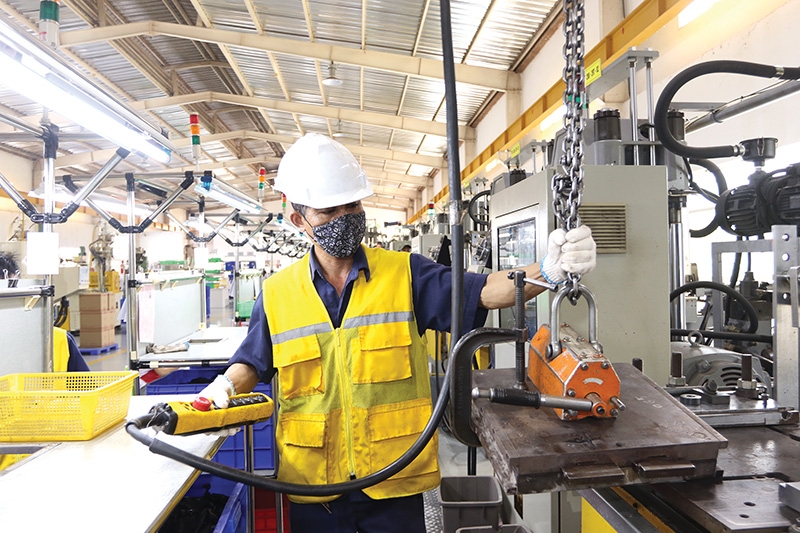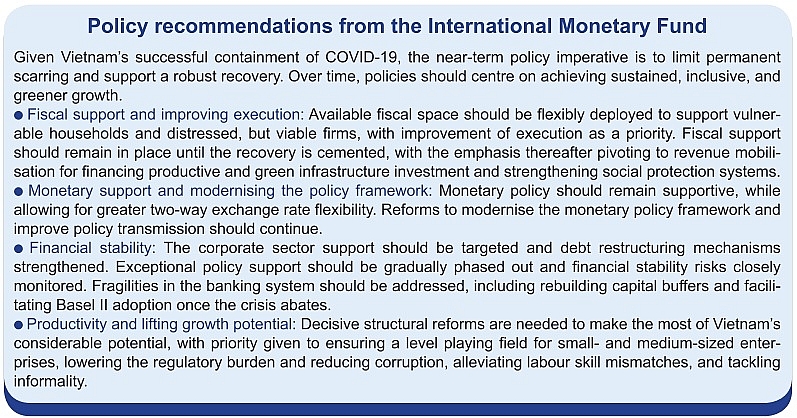Plans afoot to push production ahead
 |
| A new taskforce will gather the exact issues enterprises are having and seek to iron them out. Photo: Le Toan |
Just three weeks ago, Hoang Duc JSC, specialising in producing plastic cases for food companies in Ho Chi Minh City, had to stop operations due to prolonged social distancing.
“All our material suppliers in the city and its neighbouring provinces of Binh Duong and Dong Nai also halted operations,” Nguyen Van Duc, director of Hoang Duc Company, told VIR. “Our revenues and profits since the beginning of the year have been slashed by 80-90 per cent, meaning we are about to go bankrupt. Currently we don’t know how to pay a bank loan of nearly VND10 billion ($434,780) and its lending rate.”
Before June, Hoang Duc employed 200 workers who are now unemployed because the company has become completely exhausted. “So many enterprises like ours are all staying idle, with factories closing their doors,” Duc said.
According to the General Statistics Office (GSO), since July, the number of businesses affected by the pandemic and kicked out of the market or completing procedures for dissolution has eclipsed the number of newly-established enterprises. Specifically, the respective numbers were 79,700 and 75,800 in July, and 85,500 and 81,600. On average around 11,400 enterprises left the market every month in the first seven months of the year, and 10,700 businesses suffered from the same fate each month in the first eight months.
The pandemic has forced about 85,500 enterprises, both local and foreign ones, to halt operations and complete procedures for dissolution so far this year, up 24.2 per cent on-year. Nearly one-third, including Hoang Duc JSC, come from Ho Chi Minh City, up 6.6 per cent on-year.
Of these 85,500 enterprises, about 43,000 halted production and business, up 25.9 per cent; some 30,000 businesses stopped operation and waited for conducting procedures for dissolution, up 24.5 per cent; while as many as 12,000 firms completed such procedures, up 17.8 per cent.
The European Chamber of Commerce’s (EuroCham) Business Climate Index (BCI) for the second quarter of 2021 stated that a cautious and concerning sentiment is seen among business leaders, as they expect a difficult period ahead.
“Almost half [of surveyed members] expect the economy to deteriorate in the next three months [July, August, and September], compared to only 4 per cent in the last quarter,” said a recent BCI report.
A source from a large US animal feed producer told VIR that over the past 2-3 months, the company’s 11 mills in the southern region have been applying the stay-at-work model – meaning that production, meals, and rest happen at the same place, which has caused massive difficulties for the company.
“Costs for this scheme have soared as the company has had to buy foodstuffs and new equipment for workers, in addition to high testing costs. Workers cannot stay in the factory for a long time as they also have other responsibilities at home,” said the source. “Revenues have been slashed significantly, while the company cannot increase product prices amid strong competition.”
 |
Dents in industrial production
According to the GSO, the economy’s index for industrial production (IIP) in August decreased 4.2 per cent on-month and 7.4 per cent on-year. The 8-month IIP increased 5.6 per cent as compared to the same period last year. Meanwhile, the seven-month IIP climbed 7.9 per cent on-year.
In the first eight months of this year, manufacturing and processing – which create 80 per cent of industrial growth – ascended 7 per cent on-year; while production and distribution of electricity increased 6.6 per cent, and mineral exploitation decreased 6.2 per cent on-year – causing a 1-per-cent reduction in industrial production.
“COVID-19 has become all the more complicated in many localities, especially in the southern region. Besides that, the recent spread of the pandemic in many industrial zones in the northern provinces of Bac Giang and Bac Ninh has seriously dented industrial production,” said Le Tuan Anh, director of the Ministry of Planning and Investment’s (MPI) Department of Industrial Economy. “Many state-owned enterprises are also facing great difficulties.”
In a specific case, state-owned Vietnam Oil and Gas Group (PetroVietnam) reported that in the first half of this year, production of some of its key products – excluding liquefied petroleum gas (LPG) which went up 15 per cent on-year and assorted petrol which saw a rise of 2 per cent on-year – suffered from a reduction, such as polypropylene (13 per cent), natural gas (12 per cent), crude oil (7 per cent), electricity (10 per cent), and nitrate (13 per cent).
PetroVietnam’s six-month export turnover hit over $936 million, down 1 per cent on-year. In which, export of crude oil reached 4.55 million tonnes, down 4 per cent; and LPG export touched 133,900 tonnes, reduced by 44 per cent.
Meanwhile, state-owned Vietnam National Coal and Mineral Industries Group (Vinacomin) reported that in the first half of this year, its total revenues were estimated at $2.8 billion, down 2 per cent on-year.
In which, the revenues from coal was $1.6 billion, down 9 per cent, while production and consumption of natural minerals totalled over $347 million – up 38 per cent; production and sale of electricity hit almost $305 million – down 5 per cent; and consumption of coal hit over 22.5 million tonnes, down 5 per cent on-year – in which domestic consumption saw nearly 22 million tonnes, an on-year decrease of 6 per cent.
Vinacomin’s production of run coal touched over 20.5 million tonnes, down 3 per cent on-year, and production of clean finished coal hit almost 20.3 million tonnes, representing an on-year reduction of 4 per cent.
Also in the first half of this year, Vinacomin’s total stockpiled coal volume was 12.2 million tonnes, down by 1.7 million tonnes as compared to the beginning of this year (13.9 million tonnes).
New taskforce
Prime Minister Pham Minh Chinh last week signed and promulgated Decision No.1447/QD-TTg on establishing a special taskforce in charge of removing difficulties for enterprises and individuals. The taskforce is headed by Deputy Prime Minister Le Minh Khai, and its vice heads include MPI Minister Nguyen Chi Dung, Minister of Finance Ho Duc Phoc, and Minister of Labour, Invalids, and Social Affairs Dao Ngoc Dung, with other members being leaders of many other ministries and central agencies.
“The taskforce’s goal is to approach and gather information about difficulties of businesses and the public, and then submit timely and sound solutions to the prime minister to remove these difficulties,” said the decision.
Notably, the head of the taskforce “is allowed to use the prime minister’s stamp, and the vice heads and other members of the taskforce are allowed to use the stamps of their units in order to perform the tasks,” reads the decision.
This also means that the taskforce will have more power to decide and solve difficulties facing enterprises and the public.
This taskforce must also closely combine with the prime minister’s special taskforce on eliminating difficulties and boosting the implementation of investment projects at ministries and in sectors and localities, so that feasible consultancy can be provided for the prime minister.
According to the Korea Chamber of Business in Vietnam (KorCham), the new taskforce is expected to be a lifebuoy.
“Prolonged social distancing has driven enterprises into massive difficulties with a lack of materials and export orders,” KorCham vice president Hong Sun told VIR. “At the 9,300 South Korean firms in Vietnam, many of the over one million workers are in the lurch. Over 30 per cent of enterprises in garments and textiles and footwear have lost large orders from foreign partners due to social distancing.”
As for Hoang Duc JSC in Ho Chi Minh City, director Nguyen Van Duc said if companies like his firm fail to be supported by the government, they will “die soon”.
“We have stopped operations and don’t know when we can revive them. We hope the taskforce will take drastic actions to help the business community. But we don’t know what they will do, really,” Duc said.
What the stars mean:
★ Poor ★ ★ Promising ★★★ Good ★★★★ Very good ★★★★★ Exceptional
Related Contents
Latest News
More News
- Foreign leaders extend congratulations to Party General Secretary To Lam (January 25, 2026 | 10:01)
- 14th National Party Congress wraps up with success (January 25, 2026 | 09:49)
- Congratulations from VFF Central Committee's int’l partners to 14th National Party Congress (January 25, 2026 | 09:46)
- 14th Party Central Committee unanimously elects To Lam as General Secretary (January 23, 2026 | 16:22)
- Worldwide congratulations underscore confidence in Vietnam’s 14th Party Congress (January 23, 2026 | 09:02)
- Political parties, organisations, int’l friends send congratulations to 14th National Party Congress (January 22, 2026 | 09:33)
- Press release on second working day of 14th National Party Congress (January 22, 2026 | 09:19)
- 14th National Party Congress: Japanese media highlight Vietnam’s growth targets (January 21, 2026 | 09:46)
- 14th National Party Congress: Driving force for Vietnam to continue renewal, innovation, breakthroughs (January 21, 2026 | 09:42)
- Vietnam remains spiritual support for progressive forces: Colombian party leader (January 21, 2026 | 08:00)

 Tag:
Tag:



















 Mobile Version
Mobile Version